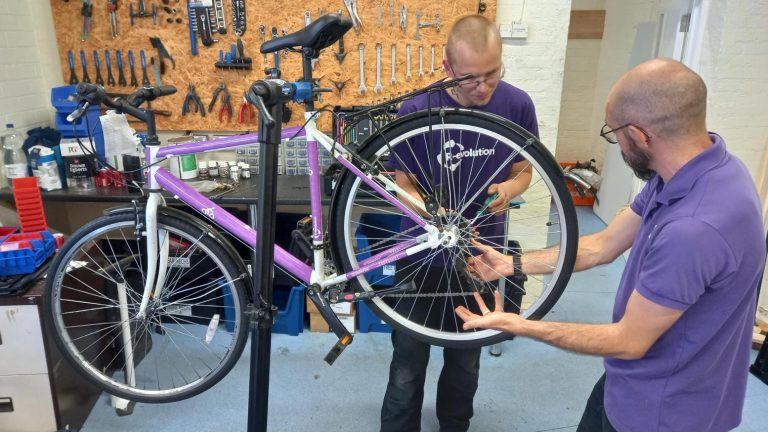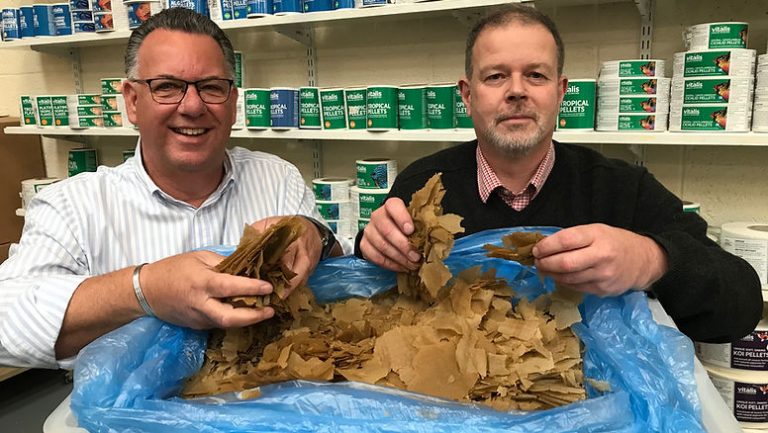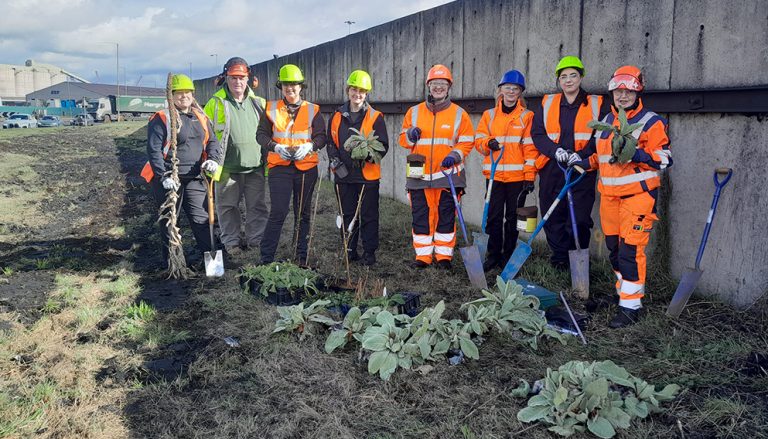Dewsbury Arcade gets £4.5m boost from National Heritage Lottery Fund
Together with the Dewsbury Town Deal Board, Kirklees Council have been successful in a bid for nearly £4.5m investment from the National Heritage Lottery Fund, to support the development of the historic Dewsbury Arcade.
The Dewsbury Arcade is a Grade II Listed building, which has been a focal feature in Dewsbury town centre since the Victorian era and is a key focus of the Dewsbury Blueprint – which lays out Kirklees Council’s ambitious plans for the future of the town.
The planned improvements will bring the arcade, which has stood empty for seven years, back into regular use.
Another key part of the development is the restoration work, which will future-proof the building’s beautiful historic architecture while the redevelopment brings it back to life.
With this crucial injection of funding, the council are now planning to start work on the arcade renovations this autumn.
With the support of the Arcade Group – a community business formed with the purpose of leasing and managing the arcade – the council are aiming to fill the reopened building with a range of independent local traders, along with a great food and drink offering.
Once the works are underway this autumn, the Arcade Group will be launching a community share group. Through this, local people will be able to elect board members and have part ownership in the business. The community share group will support the Arcade Group by raising money for developments on the business side.
Councillor Shabir Pandor, leader of Kirklees Council, says: “The purchase of the arcade back in 2020 was one of our first major steps in our Dewsbury Blueprint plans, so it’s fantastic to get news that we can make a start on our ambitious renovations.
“The arcade has always been an impressive building and a real focal point for people visiting the town centre, so to see it returned to its former glory will be fantastic. I can’t wait to see it become a vibrant thoroughfare once again, helping to reinvigorate Dewsbury’s retail offering alongside our other blueprint plans – as well as hopefully offering new opportunities to local entrepreneurs.
“I appreciate people might think things aren’t happening in Dewsbury because projects like this can be a slow process, but I hope this reassures people that we are doing a lot of work in the background. While we want to do everything right, especially where public money is concerned, and make sure we’re delivering the best possible results, we won’t deviate from our plans for the Dewsbury Blueprint.”
Councillor Eric Firth, Cabinet Member for Transport and Ward Councillor for Dewsbury East, says: “The Dewsbury Arcade is one of our more iconic buildings in Dewsbury town centre. Thanks to this funding, it’s time to bring it out of retirement and open it up to the public once more – I think I speak for everyone when I say we can’t wait to get started.
“I know local people are excited to once again have a bustling retail offering in Dewsbury, and this is one of several projects which should capitalise on our incredible independent traders to drive more value back into the local economy.”
Helen Featherstone, Director for the North of England at the National Lottery Heritage Fund, says: “We are delighted to support Kirklees Council with this project, which will restore the Dewsbury Arcade to its former glory.
“It’s fantastic to think that our investment – made possible thanks to the money raised by National Lottery players – will give this amazing heritage building a new lease of life, create new opportunities for local independent businesses and play a significant role in boosting the local economy, while contributing towards the regeneration and wider townscape of Dewsbury.”
Keith Ramsay, Chair of the Dewsbury Town Deal Board, says: “The board are thrilled at this success. Many teams and partners will be involved in the delivery of this project, and we look forward to further successes as we see the arcade restored.”
Natalie Liddle, representative of the Arcade Group, says: “The award is fantastic news. We can now get back to all the tenants that have already expressed an interest in the arcade.
“In the autumn, we will be launching a community share issue to raise £150,000 to finance the business.
“This is all about Dewsbury and turning the town centre around. We’d love to hear from anyone who wants to be part of the arcade, as a tenant or an investor.”
Cycling charity gets £60,000 grant for community cycle hub work
Cycling charity R-evolution has been awarded a grant of £60,000 from Hull City Council to maintain the existing community cycle hubs in Hull, as well as deliver two more.
The grant will help the Cottingham-based charity continue running three separate community cycle hubs in Hull, as well as two more at Orchard Park and Bransholme, until April 2024.
Since the launch of the hubs in April 2022, the service has provided reliable and dependable community spaces where residents can access a variety of specialist bike services.
Run by R-evolution staff and supported by volunteers, the cycle hubs offer services such as secure bicycle parking, bike loans, safety checks, repairs, maintenance training, and guided cycle rides.
Over the last year, the hubs have delivered over 1,579 bike repairs, loaned 218 bikes for the short and long term, and provided 249 cycle maintenance demonstrations to the public.
Councillor Mark Ieronimo, Portfolio Holder for Highways, and Transport said: “The community cycle hubs provide an important service to those who choose to cycle in and around Hull, and their work supports many of the council’s broader aims, such as encouraging modal shift, improving health, and tackling the Climate Emergency.
“For these reasons, I am delighted that the council is able to help this work continue.”
The locations and opening times of the three existing community cycle hubs, as well as the two additional sites, are as follows:
- Goodwin Trust, Walker Street – Wednesdays and Fridays 10am – 4pm
- Peel Street Park, Peel Street – Mondays 10am – 3.30pm
- The Hut, Preston Road– Tuesdays 8.30am – 4pm and Thursdays 11am – 4pm
- Alf Marshall Centre, Bransholme – Tuesdays 10am – 3pm
- St Michaels Youth Centre, Orchard Park – Fridays 10am – 4pm
Scope chooses Leeds’ Brewery Wharf for new northern HQ
Disability equality charity, Scope, is set to open a major new service hub at Brewery Wharf in Leeds.
The charity has agreed a deal to take 4,500 sq ft at 3 Brewery Wharf for its new Leeds Community Hub, creating its largest base outside of London. The hub will be home to more than 70 staff working across a range of services including community, family and employment teams as well as helpline support staff, and it also will feature a café and shop.
The specialist fit out of the new space will begin in September ahead of the hub launching early 2024. The space will be fully accessible, with plans including wide aisles and adjustable height desks for wheelchair users, as well as braille signs and specialist lighting for those with visual impairments.
Ruth Blazye, executive director of retail and communities, says: “One in four of us are disabled and are not treated equally in society. Together, as communities, we can change that. Scope’s Leeds Community Hub will be a centre for a range of the charity’s services, retail products and our community engagement work.
“The hub will also provide a space to showcase the great work, designed exclusively for Scope, by our hugely talented disabled artists and makers. The new, accessible hub will be pivotal in deepening our connections with the Leeds communities, our local Yorkshire Scope shops and will offer a community space for all.”
Scope’s lease agreement comes on the back of a raft of major milestones at Brewery Wharf which is owned by Leeds-based property investor, Rushbond, specialists in repurposing cherished locations and buildings throughout the region.
In June, legal technology provider, InfoTrack, opened a new 5,582 sq ft office at 7 Brewery Place which provides space for more than 70 staff. This is the first permanent Northern base for the company, which also has offices in London and Woking. The new office will enable the company to grow the Leeds office to 30 plus team members as well as act as a collaborative hub for its remote staff across the North of England.
Scott Bozinis, InfoTrack CEO, said: “InfoTrack is delighted to be expanding our operation with our Leeds office at Brewery Wharf. With a large and growing number of customers in the North, we’re excited to set down roots here and be able to work even more closely with them.
“We’re currently working from a small base on the site, with expansion and a full fit out in late 2023. With more than 250 people now driving the success of InfoTrack from across the country, we’re thrilled to be able to commit to Leeds and recognise the increasing talent the region boasts.”
Channel 4 News also began broadcasting from a state-of-the art new ITN studio at Brewery Wharf in May – making history as the first prime time news programme to co-present from two locations (Leeds and London). The new studio adds to Channel 4’s growing presence in the city which already is home to its northern headquarters at the landmark Majestic building in the city centre – which is also owned and redeveloped by Rushbond – which accommodates more than 200 staff.
Richard Baker from Rushbond said: “We made a concerted effort to develop Brewery Wharf in ways that would attract more creative and new media tenants, investing heavily in the public realm and refurbishing existing spaces.
“By opening up the public realm, we have created an accessible location that is ideal for Scope and we look forward to welcoming the charity and working with them to bring to life their ambitious plans for their new hub.
“It’s fantastic to see nationally significant companies like Channel 4 and InfoTrack choosing Brewery Wharf as the location for their northern head office. This place spearheaded the renaissance of Leeds’ waterfront and the South Bank, and we now have only a handful of workspaces remaining for anyone who wants to be a part of this distinctive and beautiful waterside location.”
UK net zero champion visits Humber to hear region’s huge opportunity to create low carbon roadmap
The opportunity for the Humber to become a blueprint for whole-region decarbonisation has been discussed at a roundtable featuring UK net zero champion Chris Skidmore MP.
The former Energy Minister, responsible for signing the UK’s net zero commitment into law, visited the region to hear about the progress that has been made to decarbonise industry and transition to a low carbon economy.
The discussion, which took place at Hull’s Centre for Digital Innovation (C4DI), focused on the opportunities and challenges facing the Humber region, its businesses and its people.
It highlighted the importance of focusing on whole-region decarbonisation, supporting small and medium-sized businesses on their net zero journey and ensuring the Humber has the skilled workforce and talent to achieve ambitious targets set by government.
Engaging the public and driving behavioural change was also at the heart of the conversation, as it was acknowledged many people remain unsure on the action they can take to play their part.
The session was chaired by Dr Diana Taylor, Managing Director of place promotion organisation Future Humber, and featured senior figures from leading companies and organisations including Siemens Gamesa, Humber Freeport, Reckitt, Smith+Nephew, Hull City Council and Sewell Group.
Dr Taylor said: “It’s vitally important that, when we talk about net zero, we focus on the region as a whole. We often focus the conversation on big industry, knowing the scale of opportunity that arises for the Humber through industrial decarbonisation, however the net zero transition is something which every business, organisation and person must embark on.
“We have a unique opportunity in the Humber to create a roadmap for whole-place decarbonisation, which can act as a blueprint for both the UK and Europe.”
Central to the roundtable discussion was the Humber’s unique position – both geographically and economically – as a global trade gateway, a world-leading centre for renewable energy and a hub for digital innovation.
The Humber Freeport, which recently formed its board, strengthens that offering and can act as a major catalyst for future investment around net zero.
Simon Green, Humber Freeport Interim CEO, joined the roundtable event and said: “Within Humber Freeport we’ve got three clear workstreams – decarbonisation, skills and innovation.
“When it comes to net zero and reducing carbon emissions, clearly all three of those streams overlap and interlink. It is when you combine all of those areas that the really exciting developments and opportunities start to happen.
“My message to Government is this … let’s work more closely together to enhance our relationship and unlock all of the benefits this region offers.
“We produce 15 million tonnes of carbon every year in the Humber – it is the second-largest emitter of carbon in Europe. Put simply, if the Humber region does not achieve net zero, then the UK will not either.”
Mr Skidmore was commissioned in autumn 2022 to Chair an independent review into the Government’s approach to achieving net zero status by 2050.
The report was published in March, and set out the progress which has already been made in the UK and plans for further policy to support business and industry in achieving net zero.
Speaking at the roundtable event, Mr Skidmore said: “Having been responsible for the UK’s net zero commitment signed into law four years ago this week, I am constantly struck by how businesses and industry recognise that this is a unique economic opportunity to deliver regeneration, new jobs and growth in their region.
“This is especially the case for the Humber region, which has long been the shining example of how renewable industries can transform local economies. Hull has a fantastic vision for a net zero future, that demonstrates how if we can empower regions to get on with the job, they will deliver.
“I was incredibly impressed both by the commitment of the businesses I met, but also the detail of the plans that the Humber region has.”
The session was facilitated by Future Humber, whose powerful Bondholder network spans both public and private sectors.
Doncaster animal feeds firm recognised at awards ceremony
Thorne-based animals feeds manufacturer World Feeds have been awarded Judge’s Special Recognition prize at this year’s Aquaculture Awards, held in Inverness.
The company’s has a particular specialism in aquatic nutrition and fish diets, and its products are used in major aquariums all over the globe.
The company was specifically commended for its unique VAF Feed Blocks, which have had a hugely positive effect on fish husbandry, health and welfare — being embraced across Scotland by all major salmon producers. They are now also undergoing extensive trials in Norway, with major opportunities developing in the region, as well as in Canada.
Determined to continue modernising, World Feeds says a number of other exciting projects are in the pipeline. Next up, they will be looking at the hatchery stage, with larval and broodstock diets on the horizon.
A spokesperson for World Feeds said: “Being recognised for the impact we’ve made in the industry is an honour. We wish to thank our global clients and partners for all their collaboration and support!”
How to make your home more energy efficient
Energy efficiency at home is a great way to save money, reduce CO2 emissions and help the environment. In the current economy and with the days and nights getting increasingly colder it is more important than ever that we try to make our homes as energy efficient as possible.
Lincolnshire Radiators Direct have a large, hand-picked range of quality designer radiators with 15-year guarantees and free shipping. They’ve provided this helpful and informative blog to help you be more energy efficient.
- Set your thermostat to around 18 degrees, this means whenever your house temperature drops below this your heating will kick in. This costs a lot less than if you keep turning your heating on and off and the system has to heat up from the start again.
- Bleed your radiators, this will help your home to feel warmer and make your heating system more efficient as you’ve removed air pockets. As well as reducing the pressure in your system meaning you won’t have to turn your heating up as often.
- Make sure your home is well insulated. This may mean an initial pay-out but with 35% of heat being lost through walls the investment will eventually pay for itself. Look into loft insulation, double glazing, cavity walls, and hot water tank jackets.
- It can be hard in smaller or awkwardly designed rooms to not block radiators with bulky furniture that stops heat from spreading across the room but where possible avoid blocking radiators and heaters.
- Instead focus on blocking drafts, buy draft excluders for your doors, or door curtains that keep the cool air out.
- LED energy-saving light bulbs last longer and use less energy, saving you money on your energy bill and meaning you won’t have to add bulbs to your shopping list as often.
- Draught-proofing your home can be a long process but thermal curtains are a great start, they help to block drafts and keep the heat in. Whilst it may be tempting to keep curtains open, keeping them shut when you’re out could help conserve heat in your home.
- We’re not saying to rush out and buy all new kitchen appliances as if there is nothing wrong with your current appliances this would be wasteful. However, when it is time to buy a new fridge, washing machine or dishwasher opt for an energy-efficient one by keeping an eye out for the ‘energy saving recommended’ sticker.
- If you’re not using a room, turn the lights off. This links well with turning off your TV and PC rather than leaving them on standby, this will reduce your electricity bill as well as avoid the emission of CO2.
- Wait until you have a full load to put your dishwasher or washing machine on, this saves doing multiple washes that could have been done all at once.
- Keep an eye on your weather app to see when there is a dry day to get your washing done, this could help you avoid using your tumble dryer more than necessary as whilst they’re very useful they’re also a big consumer of energy.
- This seems small, but it all adds up. Don’t overfill your kettle, if you’re just making a drink for yourself, fill the kettle to the minimum line to avoid it boiling for longer than necessary.
- Invest in a heated towel radiator, this way you can heat your bathroom whilst helping to dry damp towels between showers, avoiding the use of the tumble dryer or getting a fresh towel after one use and creating more washing.
- If you’re not using a room, such as your spare bedroom, turn the radiator down in that room, keeping it on low to avoid dampness in the cold months. A great way of doing this is installing thermostatic radiator valves onto your radiators to control the flow of water into individual radiators which allows you to control the maximum temperature in each room.
- Install solar panels: This is an expensive initial investment, but renewable energy is the cleanest form of energy and solar panels pay for themselves after around 10 years. If you plan to live in your home long-term they can be a fantastic investment.
Administrators of plant-based foods firm secure sale of manufacturing site
The administrators of Plant and Bean Limited (P&B) have sold the company’s manufacturing site and associated equipment to Vegan Solo Consulting Limited (Vegan Solo) and Duo Renovations Ltd (DRL).
P&B is a dedicated alternative protein food manufacturer based in Boston, Lincolnshire, operating from a 125,000 sq ft factory and producing vegetarian products for large brand names with placements in major supermarkets.
The company entered administration on 31 May 2023 when James Clark and Howard Smith at Interpath were appointed joint administrators.
Vegan Solo specialises in the production of meat-free products and is run by Heather Mills, the entrepreneur and a leading champion for the vegan movement. This purchase will add to Miss Mills’ existing portfolio which includes Vbites – a pioneer of meat-free substitutes.
Like several other businesses in the sector, P&B experienced significant inflation across its cost base, primarily increases in food and energy prices. The business also suffered from several operational issues stemming from a lack of investment.
It is understood that following the sale there will be a period of renovations to upgrade the production capabilities, and that Miss Mills is determined to ensure that any future manufacturing that takes place at the site be plant-based.
Heather Mills said: “I am delighted to acquire the P&B facilities and to keep it as a non-meat factory. I am also pleased to try and help the founder of P&B who has worked in a similar vein to myself for many decades to drive positive change for the environment, the animals and for the health of the global population.”
James Clark, Managing Director at Interpath and a joint administrator of Plant and Bean Limited, said: “I am delighted to secure a sale of this great facility to someone committed to investing and improving on the great manufacturing capabilities implemented by Plant and Bean. The factory has huge scope to deliver improved economic output for the Boston area and we wish the buyer all the best in their new venture.”
Air IT swoops for Yorkshire firm
Air IT, the Managed Service Provider (MSP) with offices in Nottingham and Derby, has snapped up Yorkshire and London-based Vital Technology Group.
Air IT and Vital combined employ almost 500 people and operate across eight regional UK offices, delivering a local personal service to over 2,300 clients.
Lee Evans and Alex Dawson, Joint Managing Directors of Vital, said: “We’ve spent the last 15 years developing and growing Vital into a successful regional business with an enviable local reputation.
“By joining Air IT, we’ll not only be able to offer additional technical expertise, skillsets and capabilities, whilst continuing to deliver the highest levels of service to our clients, but will continue our journey of growth, establishing Air IT as the IT partner of choice for SMEs in Yorkshire and the North East region.”
James Steventon, CEO at Air IT, said: “I’m delighted to welcome Vital to Air IT. They’re a great addition to our team, sharing a similar approach, culture, and a commitment to delivering exceptional service to clients.
“With a strong focus on Microsoft cloud solutions, we’re looking forward to combining our joint knowledge, skills and experience to deliver even greater results for our valued clients.”
Firms collaborate to create wildlife oasis
Businesses CPL Products, DFDS, and Associated British Ports are working to transform an unmanaged section of highway verge alongside West Haven Way, into a wildlife oasis at the Port of Immingham.
With support and guidance from Humber Nature Partnership, a team of nine volunteers from the companies planted foxglove, mullein and purple loosestrife to complement the herbaceous species already present in the verge such as teasel and yellow rattle.
Part of the transformation includes the creation of a 100 metre long green wall. Utilising an existing concrete boundary wall, volunteers have planted climbers such as honeysuckle, ivy and winter jasmine to prefixed sections of trellis and there are plans to put in place bird nesting boxes.
In time the 1,000 square metre verge will transform into valuable habitat for a range of wildlife including: butterflies, birds and small mammals. Along with habitat improvements for wildlife, once established the enhanced verge and green wall will also help to suppress dust in the form of particulates from the road.
Simon Bird, Director Humber, said: “As part of our commitment to sustainability we actively look for areas we can make improvements to for all manner of flora and fauna. Working in partnership is key to our work, my thanks to CPL, DFDS and the Humber Nature Partnership for bringing this project to life.”
Humber Nature Partnership Conservation Officer, Alan Jones, said: “The entire verge will now be managed as a wildlife haven and promises a year-round display. The team will be working on further development of the area across the year.”
Lincoln firm starts work on boathouse project in Nottinghamshire
Lincoln-based Lindum Construction has started work on a new boat house and restaurant space at Kings Mill Reservoir near Sutton in Ashfield in Nottinghamshire.
The project has begun with the creation of a new car park and will include the demolition of an old boat house to make way for a new two-storey structure providing modern, accessible changing and storage facilities for water sports on the ground floor, with a restaurant and function space on the first floor.
The project is one of 17 in the district being funded by £62.6m of Towns Funding and will complement the expansion of the neighbouring The Mill Adventure Base.
Lindum Construction Manager Mark Robertson said the entire project would take around a year to complete. “We are looking forward to getting started on this project, which will result in a superb leisure attraction for local people. The restaurant will be in a fantastic location with views of the water,” he said.
“We have a strong pipeline of local subcontractors who will be working on this scheme with us so the council’s investment will continue to circulate within the economy.
“It is good to be working with Ashfield District Council again. Lindum has a delivered several housing schemes for the authority over the past three years and we’ve developed a strong relationship, based on openness, trust and successful delivery of projects.”
Cllr Matthew Relf, Executive Lead for Growth, Regeneration and Local Planning added: “This is another positive step for our plans to make Mill Waters one of the top tourist destinations in the East Midlands.
“We want to hear from clubs or individuals, who are keen to get involved in developing and running water sports activities at the reservoir. Please get in touch with the team if you are interested.”
Newark-based Influence Landscape Planning and Design is the landscape architect on the project. As part of the planning application, Influence provided visual appraisal and comprehensive landscape design to complement the new building.
Kathryn Dunk, principal landscape architect at Influence, said: “Kings Mill Reservoir is a special place where nature and visitors flock. It’s a place for being close to nature, enjoying the surroundings and experiencing the myriad of water sports on offer.
“I’m really pleased that progress is being made to create the new leisure building which will sit alongside the water sports facilities and provide a place to dine and relax. Naturally landscape plays a key part here and we have created designs that responds to the specific character of the reserve, with a naturalistic planting palette of grasses and wildflowers and native Downy Birch trees reaching across the site to the water’s edge.”












